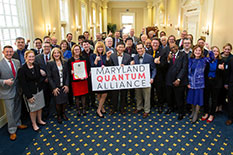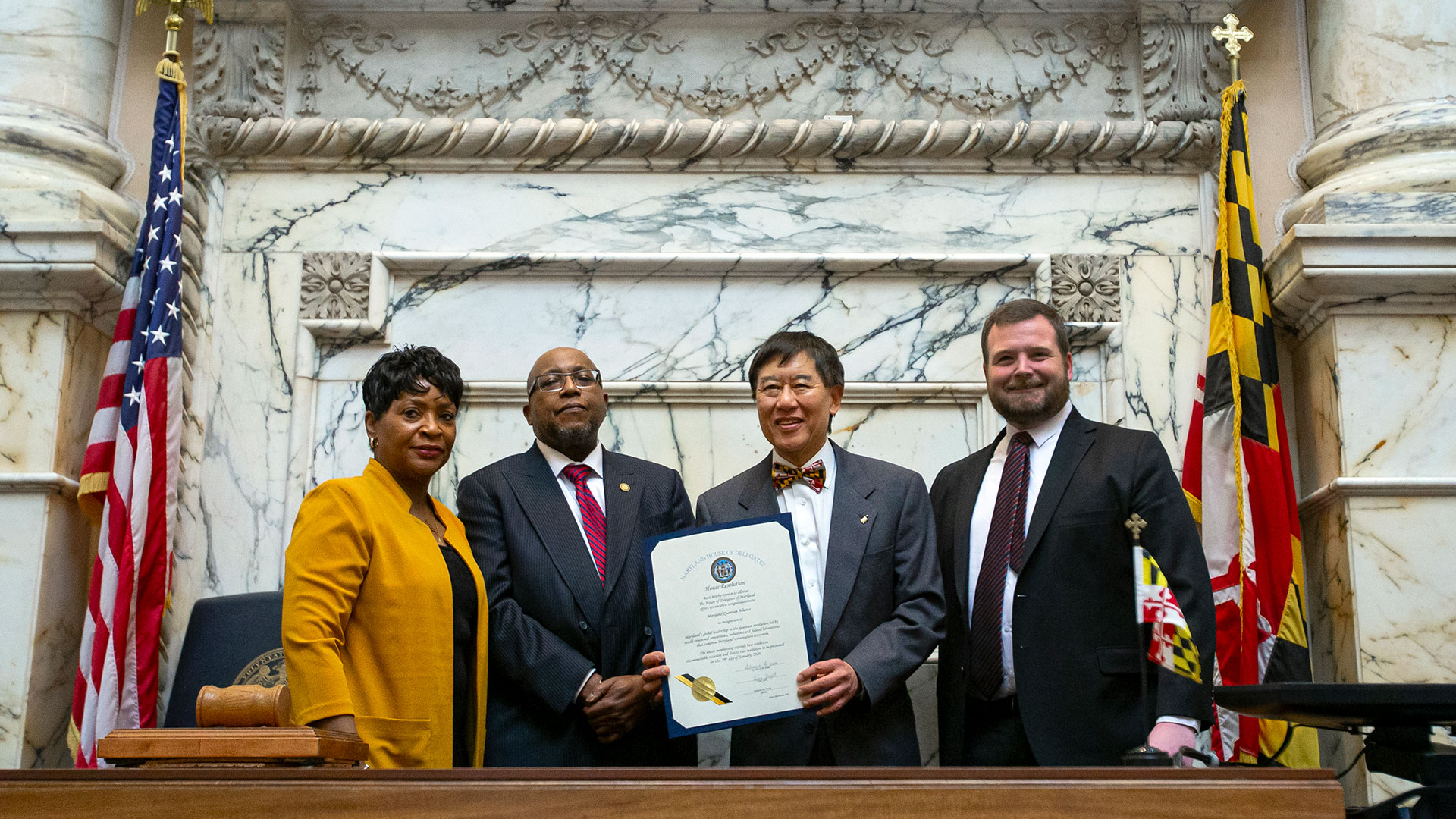UMD Convenes Alliance to Accelerate Quantum ‘Ecosystem’
Leaders from the University of Maryland, the state of Maryland and other partners gathered yesterday in Annapolis to launch an alliance designed to push innovations from quantum science and engineering into the mainstream and further enhance the region’s primacy in a field that promises to revolutionize society. Led by UMD and including other local universities, industry partners and government labs, the Maryland Quantum Alliance will develop pioneering quantum technologies—including powerful computers, sensors and networks—and train the quantum workforce of tomorrow. The alliance builds on existing assets at UMD, which is already a hub for quantum science and technology and boasts five collaborative quantum research centers: The Joint Quantum Institute and Joint Center for Quantum Information and Computer Science—collaborations with the National Institute of Standards and Technology; the Quantum Technology Center; the Quantum Materials Center; and the Condensed Matter Theory Center.
As other regions and countries increase their own investments in quantum science, “we cannot rest on our laurels,” said Vice President for Research Laurie Locascio. “For Maryland and the region, building out this quantum ecosystem can draw huge investments in research with significant job creation, and a new technology center to boost our economy,” she said. The MQA unveiling comes as quantum science research expands beyond physics into materials science, engineering, computer science and chemistry to potentially transform fields like artificial intelligence and medicine. State Del. Patrick G. Young Jr., (D-Baltimore County) and state Sen. James Rosapepe (D-College Park) introduced Maryland House and Senate resolutions heralding the new alliance, followed by a program of remarks from dignitaries from the various partners and panel discussions with scientists and students. Speakers including Loh and Maryland Commerce Secretary Kelly Shulz, who sits on the University System of Maryland Board of Regents, joked that while they don’t understand quantum science, they do know how critical it is to the region’s economy. Distinguished University Professor Chris Monroe, a physicist who co-founded the quantum computing startup IonQ, said even Albert Einstein didn’t completely buy into quantum mechanics, which deals with physics of the universe at the scale of atoms and photons. While scientists today accept it as reality, some of its counterintuitive aspects can befuddle non-physicists, he said. “It’s not quite in the mainstream yet,” he said, adding that it’s key to find ways to communicate to the public about the science and its relevance. Monroe and UMD played a key role in advocating for last year’s National Quantum Initiative Act that positions quantum information science and technology at the top of the U.S. science and technology agenda and provides $1.275 billion over five years for research. The university also is part of the Quantum Information Edge, a new nationwide alliance of U.S. national labs, universities and industry launched to advance the frontiers of quantum computing systems. In the alliance, government and academic researchers will look for new ways to work with companies both large and small to support steady progress on quantum technology research and enable its move into the marketplace. Maryland Quantum Alliance members will also work on developing cross-disciplinary educational programs in physics, engineering, materials science and computer science that will produce the necessary workforce educated in quantum science. Source: Maryland Today
Related Articles: January 30, 2020 Prev Next |



 “With our great strength in quantum science, computing and innovation, we are well positioned to lead this initiative,” said University of Maryland President Wallace D. Loh. “By combining the strength of neighboring universities, federal labs and businesses, this initiative can make the whole region into a quantum powerhouse.”
“With our great strength in quantum science, computing and innovation, we are well positioned to lead this initiative,” said University of Maryland President Wallace D. Loh. “By combining the strength of neighboring universities, federal labs and businesses, this initiative can make the whole region into a quantum powerhouse.”